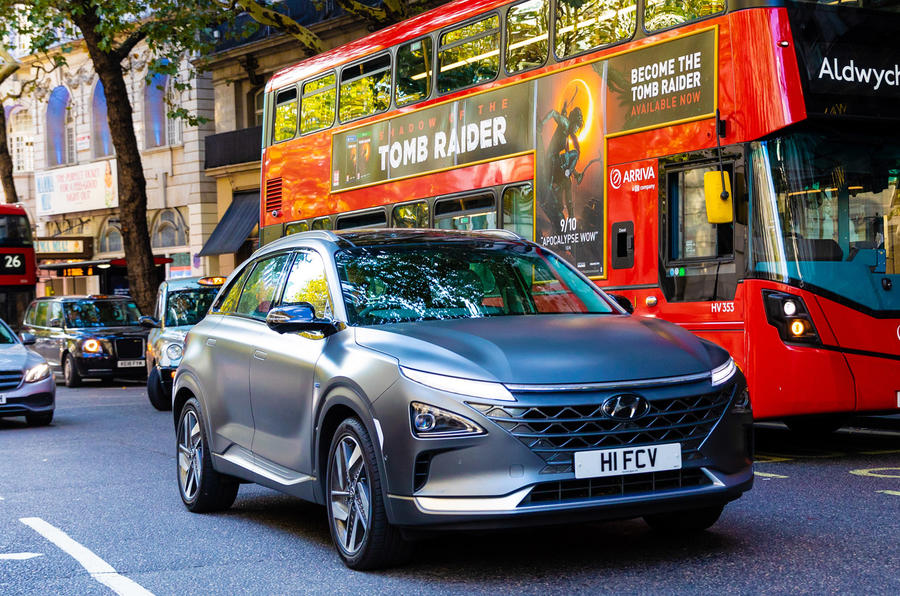The Hyundai Motor Group will invest £5.5 billion in developing hydrogen fuel cell technology, as part of plans to vastly increase the number of cars it sells that use the powertrain.
The Korean firm, which presides over Hyundai, Genesis and Kia, is one of the major proponents of fuel cell powertrains, which combine hydrogen and oxygen to produce electricity, with water the only byproduct.
Hyundai expects global demand for fuel cell powertrains to grow to around two million units per year by 2030, and to capitalise on this is planning a major investment in both research and expanding its hydrogen facilities.
This includes expanding its fuel cell system production capacity to 700,000 units per year, with plans to build up to 500,000 fuel cell electric vehicles (FCEVs) per year, for both passenger and commercial purposes. The group is also aiming to use fuel cell systems to power other vehicles, including drones, ships and forklift trucks, and for other uses, such as power generation and storage.
“We will expand our role beyond the automotive transportation sector and play a pivotal role in global society’s transformation to clean energy by helping make hydrogen an economically viable energy source,” said Hyundai Motor Group vice chairman Eui-sun Chung.
The group launched its first machine built on a dedicated fuel cell architecture, the Hyundai Nexo, earlier this year, following the ix35 Fuel Cell from 2013. Kia is set to launch its own FCEV using the platform in 2021.
Take-up of hydrogen vehicles has been relatively slow due to their high costs (the Nexo is likely to cost £65,000 when it goes on sale in the UK next year), but the powertrain system benefits from economies of scale due to the costs of buying some of the key materials needed, so increasing volume should reduce prices.
Part of the group's FCEV Vision 2030 plan is the construction of a new fuel cell system plant in Chungju, South Korea, which will help the Hyundai Mobis parts supply firm increase its output of the systems from 3000 to 40,000 units by 2022.
In June, Hyundai Motor Group reached an agreement with the Volkswagen Group to develop hydrogen technology collaboratively.
Read more
Hyundai Motor Group and Volkswagen Group team up to develop hydrogen technology
John O'Groats to Lands End in a hydrogen fuel cell Toyota Mirai













Join the debate
Add your comment
How to lose £5.5 billion
What, must mean Yen or Turkish Lira. They've already blown billions on a few thousand cars at lord knows what loss per car despite massive subsidies.
As to "Take-up of hydrogen vehicles has been relatively slow due to their high costs (the Nexo is likely to cost £65,000 when it goes on sale in the UK next year), " Slow as in 0.000001mph, on sale as in leased to 20 or so dealers.
Hydrogen cars really did go pop!
xxxx wrote:
I wouldn't write hydrogen off - it will have a place. There are many advantages of hydrogen - it can be cracked using off-cycle power for free, easier & cheaper to store excess electricity this way than batteries. Have a look at Nel Hydrogen (Norway) as an example of a producer an interesting company.
As for the cars they are the same as the current BEVs - you just replace the battery pack with a fuel-cell and a tank so all the BEV technology innovation can be applied back to FCVs. It is a better fit for the consumer as "recharge" times are the same as filling up today and so fits in with consumer habits etc and no range anxiety.
I know you want to compare the cost - which is irrelevant at the moment as the tech is sub-scale. NMC / NCA batteries were >$200 kwh in 2012 now they are ~$100 and will get cheaper - the same thing with happen to fuel-cells. And your second issue will be energy conversion efficiency - which is a bit misleading because if you crack the hydrogen using excess power (e.g. don't switch off wind on windy days) you generate the hydrogen for free so loss calcs are meaningless - it's not like we are specially burning coal to make the hydrogen.
And last point batteries are a messy business - the cobalt for NMC/NCA batteries comes from the DRC (~55%) and half of that is mined by kids - and we probably run out by 2025 if BEVs make it to 10% of global sales. Batteries last ~10k cycles and then need to be replaced and either recycled (tough) or put into battery farms which if we go hydrogen we won't need as much as current thinking. Wait until owners (or 2nd hand buyers) find they have to spring ~$10k+ for a new battery at 80k+ miles.
BEVs have a place and will win the day through to 2025 or so but hydrogen has a place too - particularly in loop-based vehicles like buses, delivery vans etc.
eekamouse1025 wrote:
Hater! You can prove anything with facts!
Running costs
You missed out you need 4 times the electric power to propel a Hydrogen car the same distance as a BEV.
Therefore running cost will always be more 4 times more than an BEV, and that ignores creating the Hydrogen, compressing it, transporting it and building a Hydrogen garage to sell it from. This is the reason Hyundai refused to publish the equivalent mpg figure (it worked out to a max of 28mpg at £10 a kilo compared to 210mpg for a LEAF)
Pretty much all non diesel buses are battery powered and that figure increases daily.
Oh as to "~$10k+ for a new battery at 80k+ miles." was that figure made up on the spot as the Taxi drivers based at Amsterdam airport with their 300,000km+ Teslas might say otherwise.
xxxx wrote:
The running costs wont be "always be more 4 times more than an BEV" if power comes from renewables - over time solar panels will continue to get more and more efficient, meaning that hydrogen power will become much more viable, hence starting to develop the tech now. If companies had taken the same attitude to BEVs 15 years ago (when battery tech was useless for vehicles), as you have now towards Fuel Cell Vehicles then there'd be ZERO BEVs around for you to cream your pants over and p*ss off even the most pro BEV car enthusiast with your stupid comments and "only one solution for everything" attitude.
typos1 wrote:
typos1 wrote:
How could anyone be so thick. It doesn't matter where the electricity comes from a Hydrogen car still need 4 times as much of it to travel the same distance. How else could you explain why the ix35 only does the equivalent of 35mpg. In the US they're give hydrogen away with the Mirra as they don't want to scare them with the cost.
And please stop dreaming about my pants
xxxx wrote:
Where do you get this stuff? Electricity is electricity. Energy is energy? How could it possibly take four times more of the stuff to power one kind of car? I'm guessing you're not an engineer or a scientist.
Some things to consider, that may or may not change your view of our hydrogen future.
The energy density of hydrogen compared with other fuels.
Hydrogen is a byproduct of several existing large scale industrial processes.
Hydrogen is literally everywhere, does not require mining, and is incomparably simple to process.
The energy the sun provides.
The very real potential of nuclear fusion.
I don't think anybody is saying you'll be driving a hydrogen car in 2025. But 2075? 2125? Come on, you sound like that guy from IBM who said that one day there might be 4 computers!
[/quote] Where do you get
[/quote] Where do you get this stuff? Electricity is electricity. Energy is energy? How could it possibly take four times more of the stuff to power one kind of car? I'm guessing you're not an engineer or a scientist. Some things to consider, that may or may not change your view of our hydrogen future. The energy density of hydrogen compared with other fuels. Hydrogen is a byproduct of several existing large scale industrial processes. Hydrogen is literally everywhere, does not require mining, and is incomparably simple to process. The energy the sun provides. The very real potential of nuclear fusion. I don't think anybody is saying you'll be driving a hydrogen car in 2025. But 2075? 2125? Come on, you sound like that guy from IBM who said that one day there might be 4 computers![/quote]
As a professional scientist I'll add this:
Yes, electricity is electricity. It will always take a certain amount more energy to produce hydrogen as opposed to storing the electricity directly. More steps in the chain = more inefficiencies. We can improve the catalytic cracking process but I very much doubt you will achieve the same efficiency as going directly to electricity. (This is coming from someone who has done research work on solar cells for direct cracking of water to form hydrogen.)
The infrastructure of electricity is a much easier transition for people right now. Everyone's home has it - we just need to change our current refuelling habits to make it work really. Yes, the heavy metals in batteries suck, and yes they're heavy - but this is something that can improve over time, especially now since the demand for these improvements (and research funding) will soar.
The industry I can see hydrogen taking off first is Aeronautical - batteries need some serious improvements in energy density to make efficient flight a possibility (the weight is a real killer). Hydrogen's energy density is a big selling point on this front!
xxxx wrote:
I'm not sure what you mean here - do you mean you need 4x the kwh to convert water to hydrogen to say travel one mile as compared to the electricity to charge a battery to travel that same one mile?
If that's your point it may be true for now but a) fuel cells efficiency is improving as new approaches to application of the platinum catalyst material and designs come in and b) it is kind of irrelevant as the electricity to crack the hydrogen is free - either through excess solar or wind which we currenty produce but don't harness because it comes at times as excess total production - the marginal cost of this electricity is effectively zero. So your £10 / kg figure might be correct today but that will be much lower once we are into mass production. Your argument is a bit like arguing petrol cars will never take off - as I'm sure some people did - because there are no refineries, storeage, transportation or petrol stations - the cost of a litre of petrol was probably £100 before we started mass production of it.
Also, once the hydrogen is produced though is it a better way to store excess electricty when compared to batteries because it is easier to transport and there is no leakage - as there is with batteries.
Again, I'm not arguing batteries won't be more important in the next ~5-10 years as car compaines struggle to meet EU CO2 targets with a much lower level of diesel sales.
And just for fun I saw a Toyota Mirai police car the other day in Ealing...